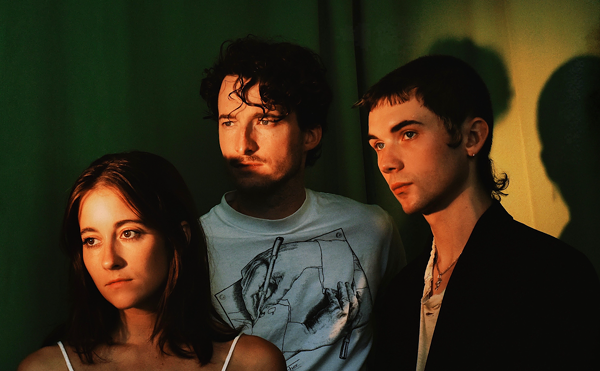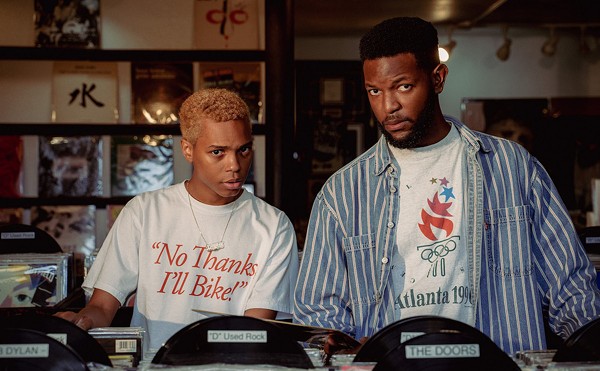Now Here Is Nowhere
SECRET MACHINES
Reprise
Think of Secret Machines as this season's Yeah Yeah Yeahs. They're a trio. They're from New York (albeit by way of Dallas). They're doing their thing somewhere in the middle of a buzz so large and intense it may actually cause tectonic plates to shift. And, like Karen O and the boys, while it would be statistically impossible to actually live up to such an absurd amount of hype, Secret Machines don't buckle under its weight, but rather deliver a serviceable and fairly original album that exhibits occasional flashes of brilliance. They don't sound anything like the Yeah Yeah Yeahs, mind you, but a final conspicuous parallel exists in the fact that Secret Machines do sound downright cool.
By combining elements of indie rock, power pop, '70s psychedelia and throbbing, dancy Old Wave synth 'n' roll, Now Here Is Nowhere manages to come off as simultaneously taut and grand, banal and ostentatious. Though a bit too much of the disc is happy to pass itself off as perfectly imagined background music for a club that infuses its regular '80s Nite with some glammy classic rock and trendy electroclash-lite, there's an interesting juxtaposition at work here — Secret Machines can't completely subscribe to deeply affected detachment, so they cut it with a generous amount of some completely unironic need to rock, to be catchy, to please.
Let's put it this way: There are four standout tracks here, and while two of them ("The Leaves Are Gone," "Pharoah's Daughter") track like those trippy, subdued Pink Floyd album cuts that always follow the huge anthems, the other two ("Sad and Lonely," "You Are Chains") build a vibe that recalls U2 at its most stadium-spectacle overblown, only without the self-conscious silliness. Not too many acts can have it both ways, but when Secret Machines go for it, they more than succeed. They rule. It's unfortunate, then, that some other cuts play it so safe, ostensibly in the name of pleasing dance-floor DJs looking for something to spin between Sisters of Mercy and OutKast. To be fair, these tunes are enjoyable as well, but when compared to what Secret Machines are really capable of, they fall somewhat short. 

 1/2
1/2
—Scott Harrell
In a Safe Place
THE ALBUM LEAF
Sub Pop
The music sneaks up on you, softly, making promises of further serenity to come. Jimmy LaValle, guitarist for San Diego's indie rock quintet Tristeza, uses The Album Leaf to create music that's soothing and easy to the ear, tranquil wanderings to enjoy while spending a quiet afternoon lounging on the couch, drinking green tea and lazily thumbing through a book of poetry. LaValle's classical training is apparent in his second effort, and he uses his guest artists (members of Sigur Ros, Maria Huld Markan of Amina, Pall Jenkins of the Black Heart Procession and cellist Gyda Valtysdottir, formerly of Mum) to create painfully delicate electronic music. "Twenty Two Fourteen" blends swelling strings and beat-driven ambience, while "On the Pond" offers a lush instrumental backdrop with haunting vocals by Sigur Ros' Jon Thor Birgisson and harmonies by the typically taciturn LaValle, who credits the surreal Icelandic setting as his primary motivation to sing. In a Safe Place parallels the last album's elegant song sequencing and melancholy tone, but surpasses it with added textures and vocal harmonies. The result is an aurally enchanting, beautifully melodic work of art. 

 1/2
1/2
—LEILANI POLK
After The War
SLEEP STATION
Eyeball
It could be said that some of the most exciting sounds in indie rock these days come from bands exploring a conspicuous love for the ambitious, classic pop sounds of the past. Actually, it should be said, so I'll say it: Some of the most exciting sounds in indie rock these days come from bands exploring a conspicuous love for the ambitious, classic pop sounds of the past. You can add New Jersey's Sleep Station to a distinguished list of contemporaries that includes the likes of The Pernice Brothers, dios, Beulah and, uh, one Wilco album (Summerteeth). This, Sleep Station's third full-length, is firmly rooted in a light, textured, unabashedly melodic vein that splits the difference between strummy country-rock and shimmering '70s AM-radio pop, imbuing the result with an intelligent, emotional and cinematic depth. And it's a beautiful thing. There's a concept here — the album's story arc concerns a World War II soldier, and examines the events defining his existence from the perspective of several peripheral characters — but you don't need to get caught up in it if you don't want to. The disc works better than well as a collection of swaying, engagingly dated pop songs, too. Its middle third (the melancholy "Burden to You" through the deceptively upbeat "A Soldier's Dream") provides the longest uninterrupted string of standout tracks, but nothing on the record falls short. Fans of earnest, accomplished and dynamic pop songs will find everything they like to hear on After The War, and if they're looking for a bit more, well, they'll find that, too. (www.eyeballrecords.com) 



—Scott Harrell
The Izzys
THE IZZYS
Kanine
There are tons of bands stealing from the British bands of the '60s who were stealing from the American black musicians who came before them. Most of these bands, however, fuck things up by not fucking things up enough — they might nail the swagger and the groove, but they forget the chicken-pickin' guitar licks drunkenly slathered over that R&B shuffle, or they forgo the perfectly wrong chord in favor of the technically correct one, or they just can't cop that wasted, burned- and bottomed-out life-weary soul. The Izzys, on the other hand, seem to have purloined the sound of The Rolling Stones' bluesy, antisocial, Americana-ripping heyday wholesale, and brought it back home to New York miraculously intact. Everything, from the instruments' tones and falsetto vocal harmonies to the country-rock jangle and edge-of-pitch lead vocal, is faithfully re-created. Too faithfully, in fact. By the time The Izzys returns from their exile on Main Street — seven tracks in — for the straight-up rocker "Strange" and heavily Uncle Tupelo-indebted "Change Your Mind," I'm already thinking about just throwing the Stones' original into the CD player. And after that two-track intermission, the band returns to its primary inspiration for the final three songs. Sure, it's good. But I don't know whether I love it for its faithfulness to an archetypal rock 'n' roll signature, or hate it for its obvious and utter lack of imagination. (www.kaninerecords.com) 


—Scott Harrell
















